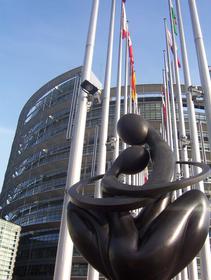Influence

- The European Parliament (Photo: sdlpyouth.com/news/?cat=6&paged=2)
Influence
By joining, the EU members lose sovereignty and influence over their own laws and policies. As a member of the EU, a country can no longer decide on various domestic and international policies on its own. These competences are conferred to the supra-national EU level.
In return, they gain influence within the whole EU. This influence is gained in the decision-making organs of the European Union.
Advocates of EU integration say that member states "pool” sovereignty and that this gives them greater influence since other member states, particularly larger ones, have to take account of the views of the smaller states.
In the Council, a country has a seat and a platform to put forward its views and decide EU policy by voting.
Votes are roughly allocated according to the size of a state's population, but with smaller countries having proportionally more votes. The Lisbon Treaty will introduce voting after the exact number of citizens from 1 November 2014.
This gives more voting power to the biggest member states.
The electorate of the EU countries is represented directly in the European Parliament. The European Parliament can propose to amend most laws proposed by the Commission. The non-elected Commission decides on the EP-proposals for amendments and they can only be finally approved by the Council. The EP is also different from national parliaments since it cannot initiate any law.
In theory, voters lose power every time decisions are moved to Brussels because decisions are then transferred from the electorate and elected representatives of the nation states to supra-national institutions and the civil servants and ministers in Brussels. In reality, members of the European Parliament often has a bigger say on the content of European laws than national MPs and governments.
Decision-making is transferred from the legislative arm of the State, the national Parliament, to the executive arm, the Government and Government Ministers. The European Parliament has an increased influence on laws – but the EP does not have the same legislative power as parliaments in the member states. MEPs have strong influence but weak powers.
From 2014, the Lisbon Treaty transfers power from the small to the big member states, by introducing voting based on the exact size of the population.
It has doubled the areas where the European Parliament have an influence. In 19 areas, the European Parliament has gained more influence without taking it from the national parliaments.
In 49 areas, the European Parliament has removed influence from the national parliaments of the member states. The voters and the national parliaments may thereby in theory lose more influence than may be gained by the European Parliament.
In 2013 there were uo to 1000 Trialogue meetings where selected memebrs of the European Parliament could influence EU law making
Links
See also Number of EU laws
